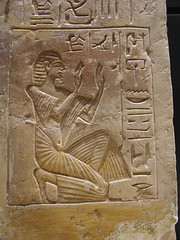
I've been working, during my free time, on a large database of ancient Egyptian names. When I began writing Bride of Amun last summer, I enjoyed a very well researched, well compiled list of Egyptian names and relied on it for the naming of my supporting characters. Sadly, about halfway through he summer and the writing of my novel, it disappeared, taken down forever by its webmistress. A great wailing was heard in the Puget Sound, while I tore out my hair searching for a similarly reliable resource. None apparently exists. All the name lists on baby-naming sites that claim to be Egyptian probably are Egyptian, but combine ancient names with modern Arabic names, as well as names from the Greek and Roman periods, clearly influenced by the trends and peoples of the time. I needed a good list of Dynastic Egyptian names, but couldn't find any.
So once I'd completed Bride of Amun and had a little time to play, I started compiling my own list.
By writing down every name I read during research, I was able to make quite a list. Once I found the book The Complete Royal Families of Ancient Egypt, my list grew to an impressive size. Now I've begun scouring records of tombs on Digital Egypt and other University-run sites, and my list has become unwieldy. I am setting it up in its own nice little database, and once I've exhausted all my resources, I'll alphabetize it, sort it by male and female, and offer it up to the internet so other novelists -- or anybody else who needs a really Egyptian Egyptian name -- can have free access.
Anyway, in working through the lists of discovered tombs, I found the name of a woman called Irtyru. Virtually nothing is known about her, other than her name, that she was a scribe (an occupation usually reserved exclusively for men) and that she served a particular God's Wife of Amun called Nitiqert during the 25th Dynasty. And that's about it.
I am intrigued by the idea of a female scribe. I've done little learning so far about women and literacy in ancient Egypt. The assumption I've made during my book(s) is that women of high standing were educated. Why not? Women, although not what modern Westerners would call "equal," still had considerable respect and rights in Dynastic Egypt. I can't imagine why they would not be taught to read and write. But why so little evidence for professional female readers and writers in Egypt?
While cleaning my goat pens at work today, I mused on this Irtyru. My brain quickly went Yentl and I immediately thought of writing a Late Period Egypt where women weren't educated as a matter of course, and where Irtyru, slight and thin and without many primary sexual characteristics to speak of, would have to masquerade as a young man to achieve the education she desired. But that's just not what I really feel Egypt must have been like, and in any case, that's a bit of an expected take on such a story. Nothing surprising there. Plus, by the end of this summer I'll have two novels in which an Egyptian girl cross-dresses to fool those around her. I'm already shy enough of writing a fourth Egyptian novel for fear of being labeled a one-trick pony. I don't want to go REALLY one-trick here.
So I will continue to turn Irtyru over in my brain until some well-formed story starts to take place. What did she do for this Nitiqert God's Wife? Why did the God's Wife choose a woman as her scribe, and not a man? That's the angle from which I must approach this very intriguing puzzle. Somewhere in the questions I'll ask myself about Irtyru and how she came to serve the God's Wife lies a story that really wants to be told.
How do you develop your stories?
That's totally cool, both the female scribe and the names database. There used to be a decent database for male names, but I haven't seen it in a while. I'm left scouring my books on ancient Egypt to find names these days.
ReplyDeleteMy stories all come from history. It only takes a line to intrigue me about a person's life.
BTW- I left you an award on my blog!
Woo! Thanks!!
ReplyDeleteYeah, darn history and its habit of being so fascinating. I've got such a queue of ideas I love from history that I'm not sure I'll ever get around to working on all the non-historical-novel plans I have!
That Irtyru does sound intriguing. I'm writing a paper about women and letters, mostly in egypt but with some delving into Greece and Rome as well. I know a lot of women seem to have been educated to read and write, but I don't think I've run across any other female scribes in Egypt! Out of curiousity, do you know what term they use for her? (The hieroglyphs for scribe, transliterated to english is roughly "seshi" with a man determinative, so it would be interesting to see if they used the same term for her!)
ReplyDeleteLast thing, for your names database (which would be totally awesome and I would definitely use. Naming people is so hard!) I'd like to recommend a book I just came across called "Who's Who at Deir el-Medina" by Benedict G. Davies. It's a great book, full of geneologies compiled from the evidence of the village. Anyhow, good luck!
~Lia